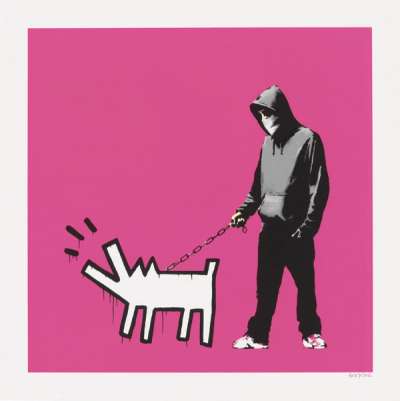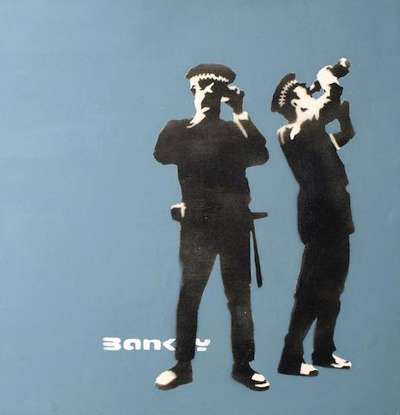Banksy's Lost Children (Glastonbury)

 Lost Children (Glastonbury) © Banksy 2005
Lost Children (Glastonbury) © Banksy 2005
Banksy
268 works
Unveiled at the 2005 iconic Glastonbury Festival, Lost Children emerges as a seminal piece for Banksy, the enigmatic street artist whose work has captivated the global audience with its provocative and politically charged narratives. This particular artwork unfurls a paradoxical tableau, featuring a grinning policeman aiding a young girl in what is implied to be an illicit act. Banksy showcases his hallmark artistic style but also embeds a trenchant critique of authority figures within the tapestry of society. This piece exemplifies Banksy’s adeptness at melding subversive content with compelling visual artistry, urging viewers to reassess established dynamics of power and control.
Lost Children (Glastonbury): Meaning and Analysis
Glastonbury and Banksy: A Perfect Creative Match
The strategic unveiling of Lost Children at Glastonbury, a festival celebrated for its eclectic musical line-up and as a bastion of cultural and political expression, significantly amplifies the artwork's impact. Glastonbury's legacy as a space where art intersects with activism provides a fertile ground for Banksy's message, ensuring its dissemination across a broad and varied audience. The festival's ethos, characterised by a spirit of openness and diversity, aligns seamlessly with Banksy’s penchant for challenging conventional norms, making it an ideal venue for this poignant artistic intervention. This is not the last time Banksy would reveal something at the festival: in 2019, he created a stab-proof Union Jack vest for the artist Stormzy, a commentary on the United Kingdom’s knife crime crisis.
Banksy’s Style and Technique
Banksy's signature use of stencils – a method born out of necessity for swift and surreptitious creation, characteristic of Street Art – has evolved into a defining feature of his artistic identity. This approach, emblematic of a guerrilla-style engagement with public spaces, allows Banksy to execute his works with a speed and efficiency that belies their often complex and layered meanings. Lost Children leverages the stencil technique to craft an image that is visually arresting and rich in narrative despite its simplicity, symbolising the broader themes of resistance and rebellion that pervade Banksy’s entire portfolio. The stark, impactful nature of stencil art, with its clear lines and bold contrasts, perfectly encapsulates Banksy’s critique of societal issues, rendering his interventions immediate yet unforgettable. Banksy’s use of stencils, historically associated with political activism and revolutionary movements, underscores the medium’s capacity for conveying potent ideological messages. In this context, the stencil is transformed from a simple artistic tool into a powerful vehicle for social critique and change.
It is clear that this artwork encapsulates the essence of Banksy’s wider artistic and social vision. Through his innovative use of public spaces, Banksy challenges us to confront and question the established order, using art as a catalyst for reflection and potential transformation. Despite his enigmatic identity, his legacy continues to provoke and inspire, establishing him as a pivotal figure in contemporary art and activism. Lost Children is not merely a piece of street art; it is a manifesto, a call to view our social structures through a lens of critical inquiry and imaginative possibility. Banksy’s work, characterised by a unique blend of wit, subversion and insight, invites the viewer through a journey of cultural exploration, challenging us to see the world anew and to reconsider our role within it. Through his art, Banksy not only critiques the world as it is but also imagines what it might become, embodying the transformative potential of creative resistance.
“Banksy’s work, especially in pieces like Lost Children, prompts a reevaluation of power dynamics and makes a profound statement on societal constructs of innocence and authority.”

Lost Children and the Criticism of Authority in Banksy’s Oeuvre
The recurrent exploration of authority figures, particularly the police, in Banksy's art, serves to question and invert traditional symbols of power. By depicting these figures in contexts that defy expectations—in this case, a policeman engaging in an act of complicity rather than enforcement—Banksy subverts the conventional imagery associated with authority. This thematic thread is woven throughout his work, inviting the audience to ponder the contradictions and complexities inherent in societal constructs of control and governance. Lost Children stands as a prime example of this motif, juxtaposing innocence with authority to provoke reflection on the nuanced interplay between the two. Despite being created almost two decades ago, this work remains a quintessential representation of Banksy's signature style and recurring motifs, encapsulating his adept use of stencil art to challenge societal norms and authority with poignant, thought-provoking imagery. This work, with its timeless critique of power dynamics and the innocence-authority paradox, showcases the enduring relevance of Banksy's art, proving that his messages continue to resonate deeply within the cultural zeitgeist. Banksy’s art transcends mere visual expression, embodying a critical commentary on the dynamics of power and the role of authority in society. The inclusion of law enforcement in unexpected and contradictory roles challenges viewers to reconsider preconceived notions about societal control and discipline.






